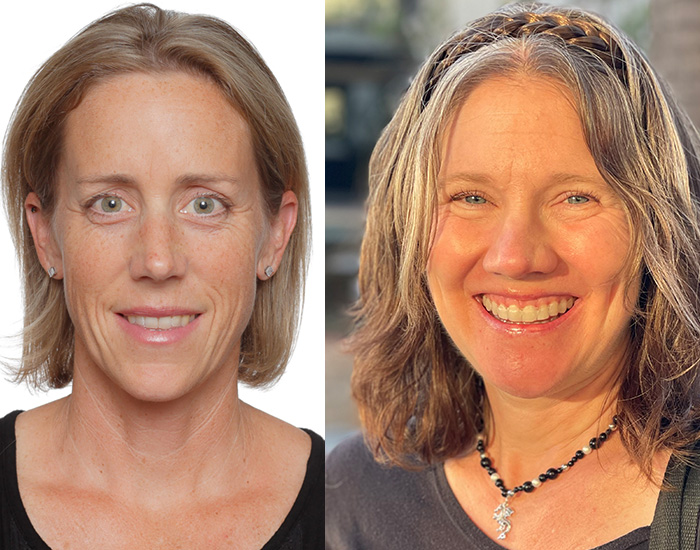When Keck Graduate Institute (KGI)’s first class graduated in 2002, they helped shape a new kind of graduate education at the intersection of science and business. More than two decades later, these pioneers continue to lead in diverse fields — including education, where they’re inspiring the next generation of innovators and leaders.
Building a Foundation at KGI
For Tiffany O’Brien, ’02 MBS, choosing KGI over a traditional PhD program was an intentional step toward a more applied career.
“I had offers for biomedical engineering PhD programs,” she said, “but I realized I was too social to spend my life in a lab. KGI’s focus on industry was exactly what I was looking for.”
As one of only 28 students in the inaugural class for KGI’s Masters of Bioscience (now the Master of Science and Business in Biotechnology (MBS)) program, O’Brien recalls the close-knit community and the collaborative learning that defined her experience.
“We had strong connections with each other and even got to give input on how courses were structured,” she said. “It was exciting to be part of something brand new.”
Her internship and Team Master’s Project (TMP) with Illumina offered an early glimpse into the biotech industry at a pivotal moment. Illumina, then an emerging player in genomic technologies, was developing a new approach to microarray analysis that promised greater efficiency and accuracy than existing methods.
“Our team’s task was to run a typical microarray using established protocols and then compare it to Illumina’s new platform,” O’Brien said. “Essentially, we were testing whether their technology produced equivalent or better results.”
The project offered a hands-on understanding of how technology moves from research to validation and eventually toward commercialization. Beyond the TMP, her KGI experience as a whole taught her how to think critically, work in teams, and communicate across disciplines.
From Biotech to High School Classrooms
After a decade working in biotech companies across California — including roles in technical services, engineering, and management — O’Brien took a leap in a new direction.
“Once I had a child, I wanted to do something that felt like it had a more meaningful day-to-day impact,” she said. “Teaching gave me that.”
For the next ten years, O’Brien taught high school math in the Escondido Union High School District, empowering her students — many of whom were Hispanic and first-generation college hopefuls — to see themselves as future scientists and leaders.
“I could see the difference I was making every single day,” said O’Brien.
Now taking a year off to focus on math education reform, O’Brien is advocating for a modernized K-12 curriculum that better reflects today’s world.
“High school math is still designed to get kids to calculus, which most will never use,” she said. “We need to focus more on teaching skills like data analysis and statistics, which actually prepare students for the future.”
Her STEM and biotech background, she believes, give her a unique perspective in bridging that gap.
“The world runs on data now,” she said. “If we want students to be ready for that world, math education has to evolve.”
Translating Science into Human Impact
Fellow 2002 MBS graduate, Kirsti Zitar, took her KGI foundation in a different direction, moving into higher education administration. Her career began at Ionian Technologies, a KGI spinoff company, before she transitioned to her undergraduate alma mater, Claremont McKenna College (CMC), in 2009.
Over the past 23 years, she has built a career that bridges science, leadership, and social impact.
“At Ionian, we were doing groundbreaking work in molecular diagnostics, even securing DARPA (Defense Advanced Research Projects Agency) funding after 9/11,” Zitar said. “It was an incredible first job that I landed directly because of KGI.”
Zitar worked closely with a small team developing tools for rapid disease detection. The company’s isothermal amplification technology could identify pathogens in minutes rather than hours, a breakthrough in point-of-care testing.
She helped craft business plans, investor presentations, market analyses, and grant proposals, applying the multidisciplinary training she gained at KGI.
Her transition to higher education began serendipitously when she attended an alumni event at CMC and was offered a position at the Berger Institute for Individual and Social Development.
Today, Zitar serves as Secretary of the College and continues to support the Mgrublian Center for Human Rights as a Strategic Advisor, where she previously served as Assistant Director. In these dual roles, she helps guide institutional strategy and develop programs that connect students to global health, ethics, and human rights careers.
Drawing on her background, Zitar encourages STEM students to explore the human dimensions of science through global health research and technology policy. Her work demonstrates how a foundation in science and business can evolve into a lifelong commitment to ethical leadership.
“In both biotech and education, I’ve relied on the same skills I learned at KGI such as public speaking, budget management, and presenting complex information clearly,” Zitar said. “Those skills have carried me through every role.”
Nurturing the Next Generation of Leaders
Whether through a high school math class or a college human rights program, O’Brien and Zitar share a belief in the power of education to shape a more informed, compassionate society.
“Education creates opportunities,” Zitar said. “It connects students to both local and international efforts and teaches them to think critically about the world they live in.”
Both women remain grateful for their time at KGI, not only for the technical and business skills they gained but also for the confidence to chart unconventional paths.
As members of KGI’s very first graduating class, O’Brien and Zitar helped lay the groundwork for a community that continues to grow, evolve, and inspire. Their stories serve as a reminder that education remains at the heart of innovation and impact.
